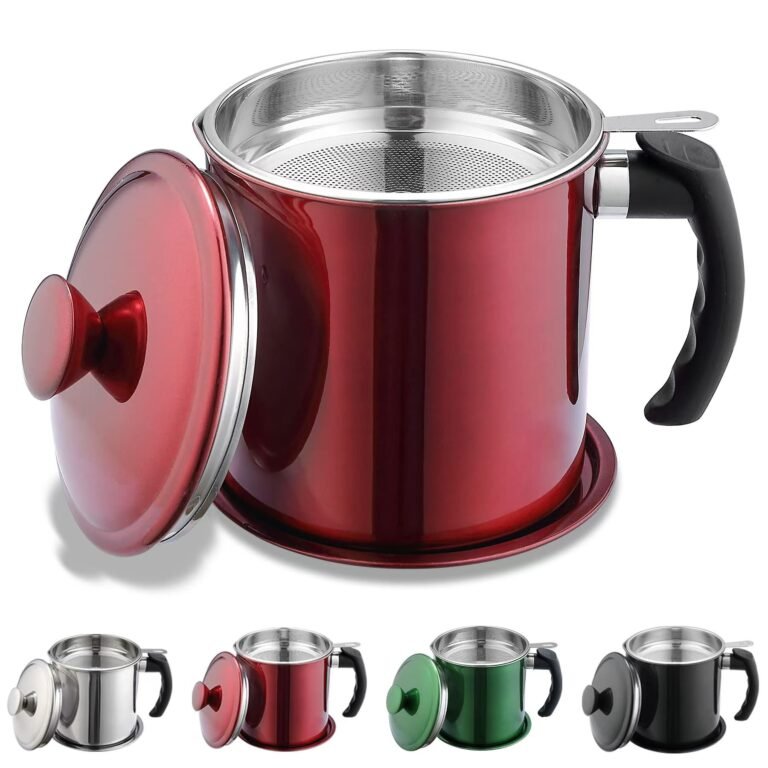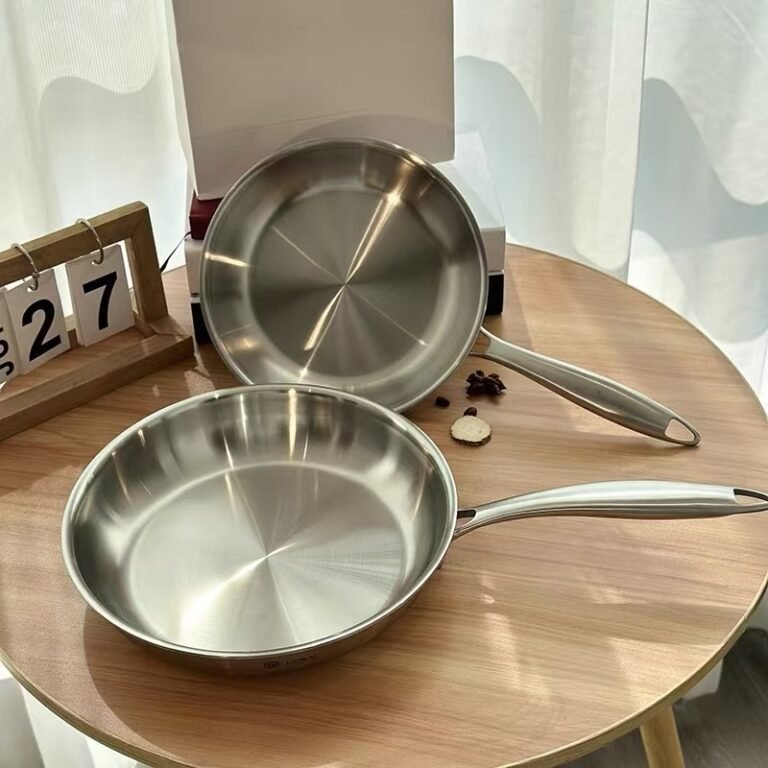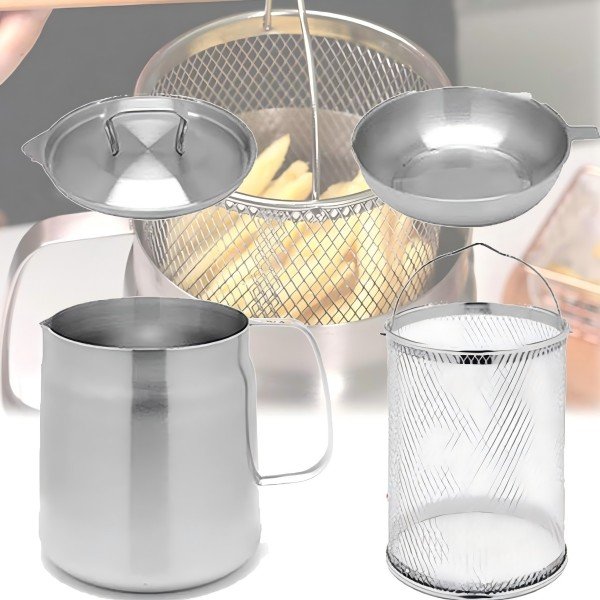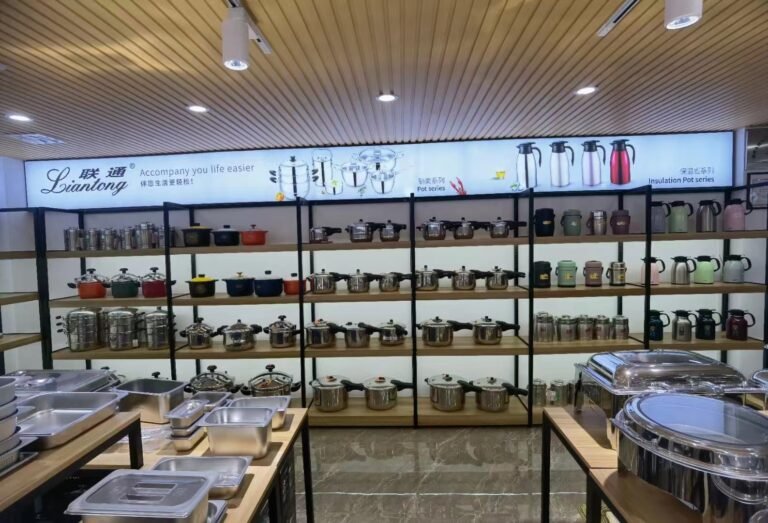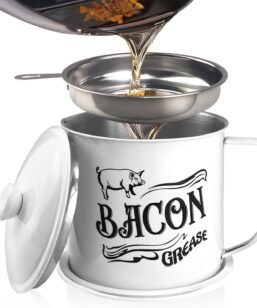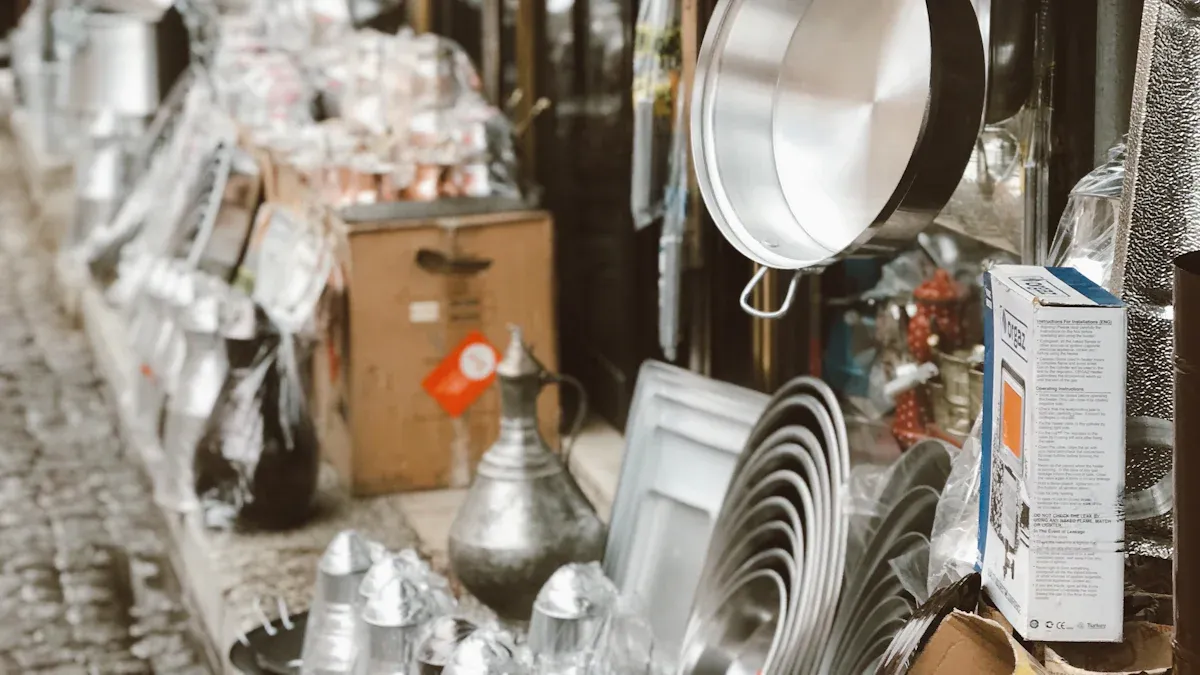
Stainless steel kitchenware delivers immediate savings for hotels and distributors through superior durability and quick cleaning. Its corrosion resistance, hygiene, and versatility support busy kitchens and maintain a professional look. Many hospitality professionals trust Liutsung Hardware Products Co., Ltd. for reliable supply. To learn more or request a quote, visit their contact-us page.
Key Takeaways
- Stainless steel kitchenware speeds up hotel kitchen work by offering durable, easy-to-clean surfaces that help staff prepare food faster and stay organized.
- Its strong resistance to dents, corrosion, and bacteria lowers maintenance and replacement costs, saving hotels money over time.
- The non-reactive, smooth surface keeps food safe and fresh while making cleaning quick and simple, supporting high hygiene standards.
- Stainless steel works well for both hot cooking and cold storage, making it a versatile choice for many kitchen tasks.
- Distributors benefit from stainless steel’s durability and standard sizes, which simplify inventory and help meet diverse client needs worldwide.
Time-Saving in Hotel Equipment
Fast Prep and Service
Hotels rely on speed and precision in their kitchens. Stainless steel kitchenware supports fast preparation and service by offering a durable and organized workspace. Industry best practices show that investing in modern stainless steel equipment leads to faster prep times, less downtime, and reduced waste. Stainless steel prep tables and utensils help chefs move quickly and efficiently, supporting a high-performance kitchen environment.
Commercial stainless steel tables, especially those made from 14-gauge type 304 stainless steel, provide the strength needed for high-volume operations. Features like undershelves and backsplashes keep tools within reach and contain spills. This organization reduces wasted motion and safety hazards. The non-porous surface allows for quick sanitization, which means staff can turn over workstations rapidly between tasks. These advantages combine to improve both the speed and quality of hotel food service.
Tip: Organized stainless steel workstations help staff maintain focus and reduce errors during busy service periods.
Easy Cleaning
Cleaning is a major time sink in hotel kitchens. Stainless steel kitchenware addresses this challenge with several practical features:
- The smooth, non-porous surface resists stains and damage, making cleaning straightforward.
- Staff can use neutral agents like ethyl alcohol or natural solutions such as vinegar and lemon for safe, effective cleaning.
- Routine cleaning only requires a soft, dry cloth, minimizing effort and time.
- The material’s durability under frequent cleaning means less maintenance and fewer replacements.
- Widespread use in professional kitchens demonstrates that these features reduce labor time.
Stainless steel’s resistance to bacteria and mold growth further reduces the need for intensive cleaning. Its ability to withstand strong disinfectants without damage allows for quick wipe-downs, helping hotels maintain hygiene standards with less effort.
Workflow Efficiency
Efficient workflow is essential in hotel kitchens where every second counts. Stainless steel kitchenware contributes to smooth operations by supporting logical kitchen layouts and reducing bottlenecks. Chefs can transition between tasks quickly because the equipment is easy to clean and always ready for use. Organized storage and prep areas, made possible by stainless steel’s modular design, help staff locate tools and ingredients without delay.
A well-designed stainless steel kitchen reduces unnecessary movement and streamlines food preparation. Staff can focus on delivering quality dishes rather than searching for equipment or cleaning up spills. This efficiency translates into faster service, higher guest satisfaction, and lower labor costs.
Cost Reduction with Stainless Steel Kitchenware
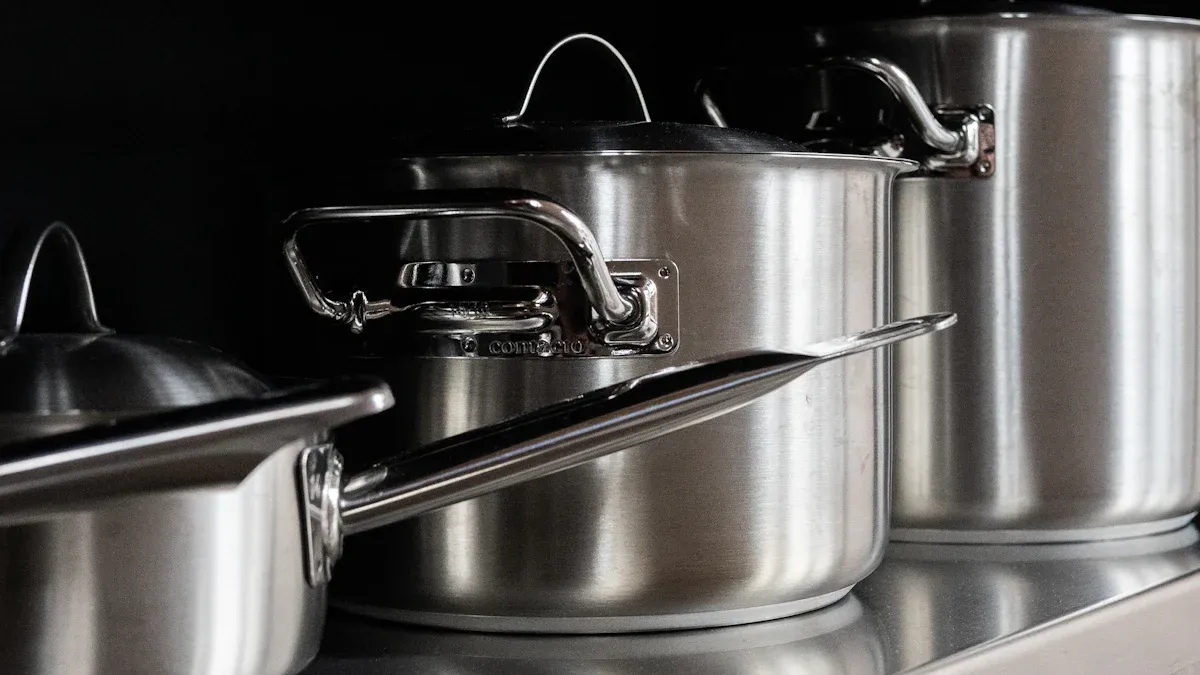
Durability and Longevity
Hotels demand equipment that stands up to daily use. Stainless steel kitchenware delivers unmatched durability. Chefs and kitchen staff often handle equipment roughly during busy service. Stainless steel resists dents, scratches, and warping. This resilience means pans, trays, and utensils maintain their shape and function for years.
Many hotels report that stainless steel products outlast alternatives like aluminum or plastic by several years. The initial investment pays off over time. Staff do not need to replace items frequently. This reliability supports consistent kitchen operations and reduces unexpected expenses.
Note: Investing in high-quality stainless steel kitchenware helps hotels avoid the hidden costs of frequent repairs and replacements.
Corrosion Resistance
Corrosion can quickly ruin kitchen equipment. Stainless steel contains chromium, which forms a protective layer on the surface. This layer prevents rust and corrosion, even in humid or acidic environments. Hotels often use cleaning agents and expose equipment to water and food acids. Stainless steel stands up to these challenges.
The following table compares corrosion resistance among common kitchenware materials:
| Material | Corrosion Resistance | Typical Lifespan |
|---|---|---|
| Stainless Steel | Excellent | 10+ years |
| Aluminum | Moderate | 3-5 years |
| Plastic | Poor | 1-3 years |
Stainless steel kitchenware maintains its appearance and performance over time. This resistance to corrosion ensures that hotels present a professional image to guests and inspectors.
Lower Replacement Costs
Frequent equipment replacement increases operational costs. Stainless steel kitchenware reduces this burden. Hotels benefit from fewer breakdowns and less downtime. Staff can rely on the same pans, trays, and utensils for many years.
Consider these cost-saving advantages:
- Fewer purchases of replacement items each year
- Lower maintenance and repair expenses
- Reduced waste and disposal costs
Tip: Hotels that standardize on stainless steel kitchenware often see a significant drop in annual equipment spending.
Stainless steel’s long service life and resistance to damage make it a smart financial choice for hotels aiming to control costs and maximize return on investment.
Hygiene and Food Safety
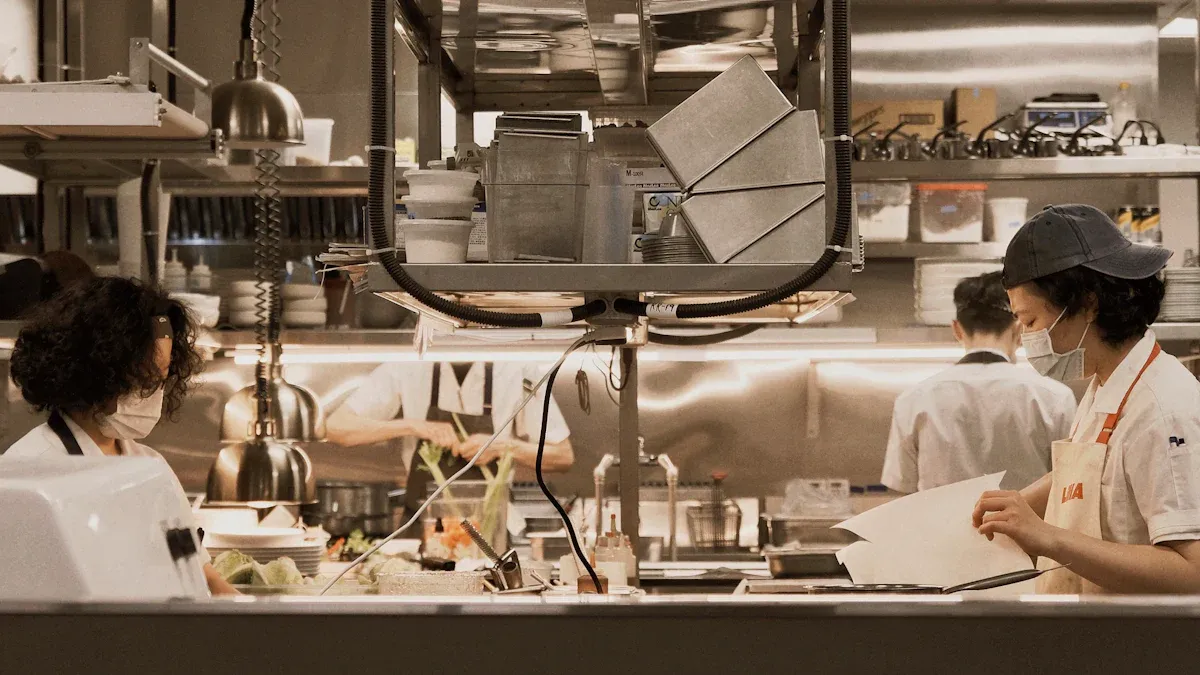
Non-Reactive Surfaces
Stainless steel kitchenware offers a non-reactive surface that protects both food quality and safety. Chefs can prepare acidic dishes, such as tomato-based sauces or citrus desserts, without worrying about unwanted chemical reactions. Stainless steel does not alter flavors or leach harmful substances into food. This property ensures that meals retain their intended taste and nutritional value.
The following table highlights key properties of stainless steel and their impact on food safety:
| Property | Explanation | Food Safety Impact |
|---|---|---|
| Corrosion Resistance | Chromium in stainless steel forms a protective oxide layer that prevents oxidation and corrosion. | Prevents contamination from rust and metal degradation, maintaining food safety. |
| Non-reactive Surface | Stainless steel does not react with acidic or alkaline foods. | Preserves original food flavors and prevents harmful chemical reactions that could compromise safety. |
| Smooth Surface | Stainless steel has a smooth texture that resists food residue and dirt retention. | Facilitates easy cleaning and reduces microbial contamination, enhancing hygiene in kitchens. |
Easy Sterilization
Hotel kitchens must meet strict hygiene standards. Stainless steel kitchenware simplifies sterilization. Staff can use high temperatures, steam, or strong disinfectants without damaging the material. This resilience allows for frequent and thorough cleaning, which is essential in busy hotel environments.
Tip: Regular sterilization of stainless steel pans and utensils helps hotels pass health inspections and avoid costly violations.
Stainless steel’s smooth surface also prevents food particles from sticking, making it easier to remove bacteria and allergens during cleaning. This feature supports a safer kitchen and reduces the risk of cross-contamination.
Bacteria Resistance
Bacteria thrive on porous or damaged surfaces. Stainless steel resists scratches and does not absorb moisture, which limits bacterial growth. Hotels benefit from this property because it helps maintain a sanitary environment, even during peak service hours.
Kitchen staff can trust that stainless steel equipment will not harbor harmful microbes. This confidence leads to safer food preparation and greater peace of mind for both chefs and guests. Stainless steel’s natural bacteria resistance makes it the preferred choice for hotels that prioritize food safety and hygiene.
Versatility in Hotel Kitchens
Cooking and Storage
Hotel kitchens require equipment that adapts to multiple tasks. Stainless steel kitchenware excels in both cooking and storage. Chefs use pans and trays for roasting, baking, and chilling without switching containers. The non-porous surface resists bacteria buildup and prevents cross-contamination. This material does not absorb odors or flavors, so food quality remains consistent. Stainless steel’s corrosion resistance allows it to withstand acidic foods and cleaning chemicals. Staff can rely on the same equipment for preparing, storing, and serving dishes, which streamlines kitchen operations.
| Feature | Description |
|---|---|
| Non-porous surface | Resists bacteria buildup, meets NSF hygiene standards, ideal for food safety in kitchens. |
| Corrosion resistance | 304-grade stainless steel withstands acidic foods, cleaning chemicals, and moisture. |
| Load capacity | Supports heavy kitchen equipment and ingredients (up to 660 lbs on top shelf). |
| Ease of cleaning | Smooth, seamless surfaces allow quick sanitation, reducing contamination risk. |
| Variety of configurations | Includes backsplash, sink combos, and mobile options to fit diverse kitchen layouts. |
| NSF compliance | Tested and approved for commercial food service, ensuring safety and reliability. |
Hot and Cold Applications
Stainless steel kitchenware performs well in both hot and cold environments. Chefs use it for cooking at high temperatures and for storing chilled foods. The material’s composition, including chromium and nickel, provides durability and a wide temperature range. Lower gauge pans offer even heating for hot food holding, while higher gauge pans heat quickly for specific tasks. Steam tables and drawer warmers demonstrate flexibility for buffet service and compact spaces. Stainless steel’s non-absorbent surface prevents flavor transfer, ensuring food safety and quality.
- Pans with lower gauge provide durability and even heating for busy kitchens.
- Higher gauge pans heat faster, supporting different cooking needs.
- Steam tables and drawer warmers offer options for hot and cold applications.
- Equipment from leading brands meets diverse requirements for professional kitchens.
Professional Appearance
A polished, professional kitchen creates a positive impression on guests and inspectors. Stainless steel kitchenware maintains a sleek, modern look even after years of use. Its smooth finish resists stains and scratches, supporting a clean and organized workspace. Hotels benefit from equipment that matches any kitchen design and upholds brand standards. The consistent appearance of stainless steel signals quality and attention to detail, which enhances the overall dining experience.
Note: Stainless steel kitchenware not only improves functionality but also elevates the visual appeal of hotel kitchens.
Distributor Advantages
Simplified Inventory
Distributors often face challenges with inventory management. Stainless steel kitchenware streamlines this process. Its durability and versatility allow distributors to stock fewer product variations while still meeting a wide range of client needs. Many items, such as pans and trays, serve multiple functions in both cooking and storage. This flexibility reduces the need for large inventories and minimizes storage costs. Distributors can also benefit from standardized sizing, which simplifies order fulfillment and reduces errors.
Efficient inventory management leads to faster delivery times and improved customer satisfaction.
Meeting Client Needs
Global distributors must address diverse requirements from hotels and food service providers. Stainless steel kitchenware adapts to various culinary traditions and operational standards. Manufacturers often offer customization, such as specialized handles or unique pan sizes, to suit regional preferences. For example, some suppliers have developed products tailored for Middle Eastern, Spanish, and Korean markets. This adaptability helps distributors serve clients in different countries and expand their market reach.
Distributors also gain confidence by offering products that comply with international certifications like ISO 9001 and EN 12983-1. These certifications ensure safety and quality, which builds trust with clients worldwide. Distributors who provide certified products can enter new markets and meet the expectations of demanding customers.
Quality Reputation
A strong reputation for quality gives distributors a competitive edge. Stainless steel kitchenware, known for its compliance with global standards, supports this reputation. Case studies from leading brands show that high-quality products attract attention at major trade events and open doors to new business opportunities. For instance, Garbo stainless steel cutlery gained rapid success at international fairs by demonstrating compliance with strict standards and exceeding consumer expectations.
Manufacturers who follow ISO 9001, ISO 14001, and ASTM standards show a commitment to excellence. Reliable delivery networks and positive customer reviews further enhance distributor credibility. Distributors who partner with trusted suppliers, such as Liutsung Hardware Products Co., Ltd., benefit from consistent product quality and dependable service. This partnership helps them maintain a strong reputation and grow their client base in competitive markets.
Real-World Results
Hotel Success Stories
Hotels worldwide have reported measurable improvements after upgrading to high-quality stainless steel solutions. For example, a leading business hotel in Singapore replaced its aging cookware with customized GN pans. The kitchen team noticed a 30% reduction in prep time during breakfast service. Staff attributed this improvement to the pans’ even heat distribution and easy-to-clean surfaces. The hotel also saw a drop in replacement costs, as the new pans resisted dents and corrosion even after months of heavy use.
Another boutique hotel in Spain adopted modular stainless steel prep stations. Chefs found it easier to organize ingredients and tools, which led to faster service and fewer errors during peak hours. The hotel’s management highlighted improved hygiene scores during health inspections, thanks to the non-porous surfaces that resisted bacteria buildup. These changes contributed to higher guest satisfaction and positive online reviews.
Hotels that invest in durable, easy-to-maintain equipment often experience smoother operations and long-term savings.
Distributor Growth
Distributors have also experienced significant growth by offering premium kitchenware. The following table summarizes how different distribution channels benefit from high-quality products:
| Distribution Channel | Growth Highlights |
|---|---|
| Online Stores | Surge in sales due to convenience, broad selection, and home delivery. |
| Supermarkets/Hypermarkets | Increased trust and bulk sales from in-person product evaluation and urban accessibility. |
| Specialty Stores | Attraction of quality-focused consumers seeking expert advice and premium products. |
| Other Channels | Expanded reach through personalized service and direct interaction with buyers. |
Several factors drive this growth. Rising consumer demand for durable and attractive kitchenware, the expansion of online retail, and product innovation all play key roles. Distributors who partner with reputable manufacturers can enter new markets, especially in regions like Asia-Pacific where urbanization and rising incomes fuel demand. Specialty retailers benefit from curated selections and collaborations with luxury brands, while supermarkets leverage bulk purchasing and consumer trust.
Distributors who focus on quality and adaptability position themselves for long-term success in a competitive market.
Hotels and distributors gain clear advantages by choosing high-quality, customizable products. Key benefits include:
- Time savings and lower costs
- Improved hygiene and versatility
- A professional appearance in every kitchen
Liutsung Hardware Products Co., Ltd. offers a trusted catalog for those seeking an equipment upgrade. Staying competitive in hospitality starts with the right tools.
FAQ
What makes stainless steel kitchenware ideal for hotel kitchens?
Stainless steel offers durability, corrosion resistance, and easy cleaning. Chefs rely on its non-reactive surface for safe food preparation. Hotels benefit from its professional appearance and long service life.
How does stainless steel kitchenware reduce operational costs?
Hotels experience fewer replacements and repairs. Stainless steel resists dents and corrosion, which lowers maintenance expenses. This reliability helps hotels control budgets and maintain consistent kitchen operations.
Can stainless steel kitchenware handle both hot and cold applications?
Yes. Stainless steel withstands extreme temperatures. Chefs use it for roasting, baking, chilling, and storage. Its versatility supports a wide range of kitchen tasks.
Is stainless steel kitchenware safe for food contact?
Absolutely. Stainless steel meets international food safety standards. Its non-porous surface prevents bacteria buildup and does not react with acidic foods. This ensures safe and hygienic meal preparation.
Why do distributors prefer stainless steel kitchenware?
Distributors value its durability, standardized sizing, and compliance with global certifications. These features simplify inventory management and help meet diverse client needs across international markets.

